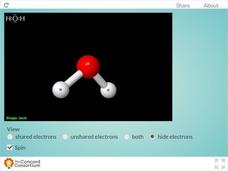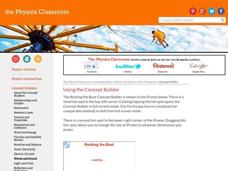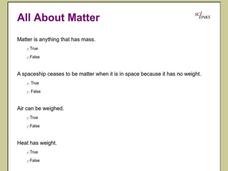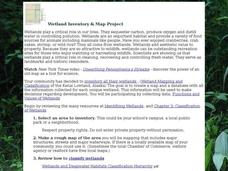Concord Consortium
Unshared Electrons and the "Bent" Shape
Why is water always so bent out of shape? Scholars investigate the molecular geometry of the water molecule using a 3-D resource. The interactive features options such as rotation and the ability to view electron pairs.
Fuse School
QUIZ: Properties of Water and Dilution
What's the solution to gaining insight into your class' progress? Give this brief quiz a try! Part 10 of a 14-installment series on states of matter tests learners' skills in the areas of dilution and the properties of water,...
Physics Classroom
Rocking the Boat
Sometimes it's okay to rock the boat! Science scholars manipulate wave properties using a fun interactive. Part of a larger playlist that dives into waves and sound, the lesson helps users work their way from apprentice to wizard by...
CK-12 Foundation
The Marina
Breakwaters offer marinas and beaches protection from large ocean waves, but how do they work? Scholars observe wave patterns and wave amplitude during the simulation. They control the number of openings, width of openings, distance...
CK-12 Foundation
Stow Lake
Does the depth of a pond matter to the waves created when rain is falling? Many people assume the answer is no, but interestingly, it does matter. Pupils explore this concept and other variables related to wave behavior through a...
American Museum of Natural History
Journey to the Bottom of the Sea
Follow the path to the sea floor. Pupils play an online interactive board game to reach the bottom of the sea. Participants must match descriptions of creatures to a property of water dealing with oxygen, food, light, or density to move...
Curated OER
All About Matter
Twenty-four questions about matter, the states of matter and the properties of matter make up this interactive online instructional activity. Your class will determine the volume of water, the shape of water and the shapes of matter.
Curated OER
Wetland Inventory and Map Project
In this wetlands inventory and map project worksheet, students do research on the wetlands and complete a map project about it. Students follow 6 sets of directions with Internet links.
Curated OER
Tree Inventory and Map Project
In this tree inventory and map project activity, students follow the directions on how to take inventories of trees and create a map from it. Students follow 4 sets of directions.
Curated OER
Gas and Oil Royalties
In this gas and oil worksheet, students read articles about the gas and oil industry and the royalties that are collected. Students then write a letter to their Senator about their feelings toward oil issues and answer short answer...
Curated OER
Explorit's Garden Quiz: How Does Your Garden Grow?
In this plants worksheet, students complete a 6 question multiple choice quiz about gardening, plants and agriculture. This is an online interactive worksheet.
Curated OER
Explorit's Green Salad Quiz
In this food history instructional activity, students read the information about the history of food and salads. Students select the correct answer for the 6 related questions.
BBC
Bbc Schools: Ks2 Bitesize: Science: Materials: Changing States
Investigate the changing states of water as you help Steve stay alive while in the Arctic. Includes background information about changing states of matter and about the water cycle, as well as a quiz.
Other
Science Alive: Melting Point Simulation
Percy Julian and Josef Pikl used the fact that melting point-the temperature at which a substance changes from a solid to a liquid-is a characteristic property of a substance to prove that the British chemist Robert Robinson could not...
Math Science Nucleus
Math/science Nucleus: Nu, You, and Water Animation
This animation discusses water and its properties in a storybook format. An emphasis is placed on filtration and purification of water.
BBC
Bb Ci Schools: Revisewise Science: Solids, Liquids, Gases
This site contains an interactive activity in which students can learn about the three states of matter. There is also a factsheet that lists numerous properties of liquids, solids, and gases. The factsheet also uses water as an example...















